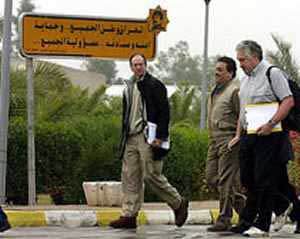| Some cameras left to monitor the Al Karama
General Co. complex also could not be found, a U.N. statement said on the
fifth day of the round of inspections, which resumed Wednesday.
U.N. missile, biological and chemical experts
spent six hours at the military-industrial complex, which is surrounded
by high walls topped with barbed wire and military guard posts.
The complex -- described by the United
Nations as a principal missile development facility -- was a target of
coalition airstrikes that marked the end of the last round of inspections
four years ago. Iraqi officials said 18 missiles hit the site in 1998.
U.N. Security Council resolution 1441,
passed November 8, demands Iraq give up any nuclear, chemical or biological
weapons efforts or face serious consequences. Iraq, which denies it has
such weapons, has pledged full cooperation with the inspectors.
President Bush, who has said the United
States will act to disarm Iraq if diplomatic efforts fail, told U.S. military
leaders Monday he was not encouraged by what he called Iraq's general lack
of cooperation since the inspections resumed.
"The inspectors are not in Iraq to play
hide and seek with Mr. Saddam Hussein," Bush said in remarks at a White
House signing ceremony for a $355 billion defense spending bill for 2003.
"Inspectors do not have the duty or the
ability to uncover terrible weapons hidden in a vast country. The responsibility
of inspectors is to simply confirm the evidence of voluntary and total
disarmament." (Full story)
U.N. inspectors said they believe the al-Kamarah
complex was used in the 1990s to produce parts for a variant of the Scud
missile, one capable of going 400 miles.
Iraq is allowed to have only missiles with
a range of less than 90 miles. Al-Kamarah still produces short-range missiles,
the site director said.
Iraqi officials at the site said inspectors
in Monday's tour were given full access to the facility and went through
documents there.
Another team of inspectors visited three
alcohol-producing factories Monday, marking the first time two of those
plants had come under U.N. scrutiny.
Alcohol can be used to make chemical weapons,
but it was not immediately clear why the factories were chosen.
Aluminum tube admissions
Meanwhile, Iraqi officials told U.N. inspectors
they tried to buy aluminum tubes to use in building conventional rockets.
According to a high-ranking official close
to the U.N. inspectors, the Iraqis said they were unsuccessful and denied
the type of aluminum tubes could be used in a nuclear weapons program.
The United States said previously that
Iraq was trying to get aluminum tubes to use in its nuclear weapons program.
Any attempt by Iraq to import materials that can be used for weapons would
be considered a violation of the U.N. sanctions regime.
The high-ranking official, who was at meetings
in Baghdad with Iraqi counterparts November 19 to re-launch the inspections,
said Iraqi officials disclosed to the chief U.N. weapons inspectors the
diameter and thickness of the tubes.
Arms experts said if the tubes are of the
size Iraq claims, they could not be used for centrifuges for enriching
uranium.
"They're saying that they violated the
sanctions, which is a much lesser offense than if they had been trying
to build nuclear weapons or long-range missiles," former CIA analyst Ken
Pollack told CNN.
"What they are trying to do is to basically
plead guilty to the lesser charge in hopes that will make it much harder
for the United States to use that to build international support for a
war."
The weapons inspectors expect a more complete
accounting in the declaration Iraq must make to the United Nations on its
weapons on December 8.
"That declaration must be credible and
complete. Or the Iraqi dictator will have demonstrated to the world once
again that he has chosen not to change his behavior," Bush said at the
signing ceremony.
Analysts said U.N. weapons inspectors will
need to see the tubes and talk to their suppliers to determine whether
they could be used to produce nuclear weapons.
The revelation came as Britain's Foreign
Secretary Jack Straw unveiled a dossier accusing Iraqi leader Saddam of
masterminding widespread and "horrific" human rights abuses. (Full story)
No-fly zone attacks denounced
In a letter to U.N. Secretary-General
Kofi Annan, Iraqi Foreign Minister Naji Sabri denounced repeated air raids
by coalition aircraft in the no-fly zones as state terrorism and said Iraq
would always defend itself.
"The raids by American and British planes
on Iraq cities and villages and the infrastructure of the Republic of Iraq
... is state terrorism, wanton aggression and rude interference in Iraq's
internal affairs," the letter said.
Reports from the Iraqi state-run news agency
said four people were killed and 27 wounded in attacks Monday in the southern
port of Basra.
The U.S. military insisted its planes launched
"precision-guided" weapons at Iraqi air defenses and that as always they
took pains to avoid hitting civilians.
The no-fly zones, designed to protect Kurds
in northern Iraq and Shiites in the southern part of the country from the
Iraqi regime, have been a focus of contention between the U.S.-British
coalition and Iraq since they were established after the Persian Gulf War
in 1991 -- without a specific U.N. resolution.

|
